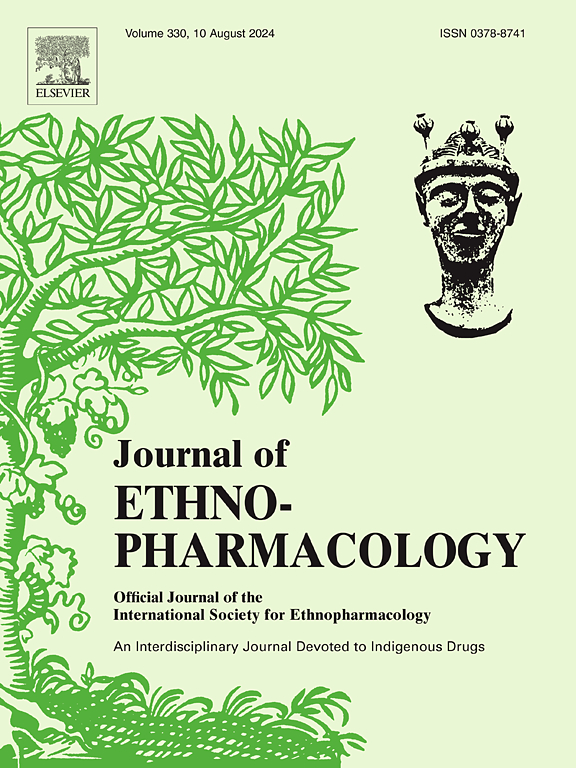头农散加味对溃疡性结肠炎自噬及线粒体功能的调节作用。
IF 4.8
2区 医学
Q1 CHEMISTRY, MEDICINAL
引用次数: 0
摘要
民族药理学相关性:头农散加味是一种广泛用于治疗体表溃疡的中药方剂。由于结肠溃疡具有相似的病理特征,MTNP在缓解溃疡性结肠炎(UC)方面显示出良好的效果,并已安全用于临床实践。研究目的:本研究旨在探讨MTNP如何通过调节amp活化的蛋白激酶(AMPK)/过氧化物酶体增殖体活化受体γ辅助激活因子1- α (PGC-1α)信号通路诱导自噬,从而减轻实验性结肠炎。材料与方法:采用2,4,6-三硝基苯磺酸(TNBS)制备UC大鼠模型。通过疾病活动性指数、视觉检查、结肠组织学检查等多种方法评价MTNP对tnbs性结肠炎的治疗效果。用H2O2在Caco-2细胞中建立炎症模型。Western blot检测自噬相关蛋白的表达,免疫荧光检测检测蛋白定位。此外,通过实时定量聚合酶链反应(qPCR)分析自噬相关基因的表达,证实了MTNP在调节AMPK/PGC-1α信号通路中的作用。结果:在体内,口服MTNP可显著减轻结肠损伤,抑制炎症浸润,改善结肠组织中炎症因子的异常表达。此外,MTNP通过激活AMPK/PGC-1α信号通路刺激自噬,从而减轻线粒体功能障碍。在体外实验中,暴露于MTNP含药血清(MTNP- ds)导致活性氧水平降低,线粒体膜电位升高,AMPK/PGC-1α通路激活,从而促进线粒体自噬。结论:MTNP在体外和体内均可触发自噬,增强线粒体功能,减轻UC的发生。这些益处与AMPK/PGC-1α信号通路的激活密切相关。本文章由计算机程序翻译,如有差异,请以英文原文为准。

Modified Tou Nong Powder obstructs ulcerative colitis by regulating autophagy and mitochondrial function
Ethnopharmacological relevance
Modified Tou Nong Powder (MTNP) is a traditional Chinese medicine formula widely used for treating body surface ulcers. Since colonic ulcers share similar pathological characteristics, MTNP has shown promising results in alleviating ulcerative colitis (UC) and has been safely used in clinical practice.
Aim of the study
This study aims to investigate how MTNP alleviates experimental colitis by inducing autophagy through the regulation of the AMP-activated protein kinase (AMPK)/Peroxisome proliferator-activated receptor gamma coactivator 1-alpha (PGC-1α) signaling pathway.
Materials and methods
In this study, UC rat models were created using 2,4,6-Trinitrobenzenesulfonic acid (TNBS). The therapeutic effects of MTNP on TNBS-induced colitis were evaluated through various methods such as disease activity index, visual examination, and histological examination of the colon. An inflammation model was also established in Caco-2 cells using H2O2. Western blot analysis was used to assess the expression of autophagy-related proteins, while immunofluorescence detection was employed for protein localization. Furthermore, quantitative real-time polymerase chain reaction (qPCR) was performed to analyze the expression of autophagy-related genes, confirming the role of MTNP in modulating the AMPK/PGC-1α signaling pathway.
Results
In vivo, oral administration of MTNP led to a remarkable reduction in colonic injury, inhibition of inflammatory infiltration, and improvement in the abnormal expression of inflammatory factors in colonic tissues. Furthermore, MTNP stimulated autophagy by activating the AMPK/PGC-1α signaling pathway, thereby mitigating mitochondrial dysfunction. In vitro, exposure to MTNP drug-containing serum (MTNP-DS) resulted in a reduction of reactive oxygen species levels, improvement in mitochondrial membrane potential, and activation of the AMPK/PGC-1α pathway, leading to the promotion of mitochondrial autophagy.
Conclusion
The results indicate that MTNP triggers autophagy and enhances mitochondrial function, leading to the alleviation of UC in both in vitro and in vivo. These benefits are strongly linked to the activation of the AMPK/PGC-1α signaling pathway.
求助全文
通过发布文献求助,成功后即可免费获取论文全文。
去求助
来源期刊

Journal of ethnopharmacology
医学-全科医学与补充医学
CiteScore
10.30
自引率
5.60%
发文量
967
审稿时长
77 days
期刊介绍:
The Journal of Ethnopharmacology is dedicated to the exchange of information and understandings about people''s use of plants, fungi, animals, microorganisms and minerals and their biological and pharmacological effects based on the principles established through international conventions. Early people confronted with illness and disease, discovered a wealth of useful therapeutic agents in the plant and animal kingdoms. The empirical knowledge of these medicinal substances and their toxic potential was passed on by oral tradition and sometimes recorded in herbals and other texts on materia medica. Many valuable drugs of today (e.g., atropine, ephedrine, tubocurarine, digoxin, reserpine) came into use through the study of indigenous remedies. Chemists continue to use plant-derived drugs (e.g., morphine, taxol, physostigmine, quinidine, emetine) as prototypes in their attempts to develop more effective and less toxic medicinals.
 求助内容:
求助内容: 应助结果提醒方式:
应助结果提醒方式:


